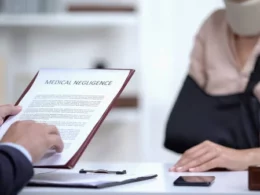Imagine that you or a loved one has suffered from medical negligence. You trusted the medical professionals to provide the best care possible, but instead, you were left with serious injuries and mounting medical bills.
You may be wondering if you can get legal aid to help you seek justice and compensation for the harm caused. However, the process of seeking legal aid for medical negligence can be daunting, and you may have concerns about the cost and complexity of the legal system.
But don’t worry, this article aims to provide you with a clear understanding of how you can get legal aid for medical negligence and the challenges you may face. We will discuss the eligibility criteria for legal aid, the types of legal aid available, and the steps you can take to find a suitable lawyer to represent you. We will also address some of the common worries and challenges you may face, such as the cost of legal aid, the time it takes to resolve a case, and the emotional toll of pursuing legal action.
After reading this article, you will have a better understanding of how you can get legal aid for medical negligence and the steps you can take to ensure you get the best possible outcome. So, if you or a loved one has suffered from medical negligence, read on to learn how you can seek justice and compensation.
Legal Aid for Medical Negligence
What is Medical Negligence?
Medical negligence occurs when a healthcare provider fails to provide a reasonable standard of care, resulting in injury or damage to the patient. This can include misdiagnosis, incorrect treatment, negligent treatment, failure to diagnose, and surgical errors, among others. Medical negligence can give rise to medical malpractice claims if the negligence was the direct cause of harm that the patient should be compensated for.
Can You Get Legal Aid for Medical Negligence?
Yes, you can get legal aid for medical negligence. Legal aid is a government-funded program that provides free legal services to those who cannot afford them. If you have been a victim of medical negligence and cannot afford to hire a lawyer, you may be eligible for legal aid.
How to Qualify for Legal Aid
To qualify for legal aid, you must meet certain income and asset requirements. Each state has its own criteria, but generally, you must have a low income and few assets. You will also need to provide evidence of your financial situation, such as pay stubs, bank statements, and tax returns.
What to Expect When Applying for Legal Aid
When applying for legal aid, you will need to fill out an application and provide documentation of your financial situation. You may also need to provide medical records, witness statements, and other evidence to support your claim of medical negligence. If you qualify for legal aid, a lawyer will be assigned to your case.
It is important to note that there may be time limits for filing a medical malpractice lawsuit, so it is important to act quickly. Additionally, you may need to pay for certain expenses, such as medical assessments, out of pocket.
If you are unable to qualify for legal aid, you may still be able to receive pro bono legal services through a pro bono program or a medical malpractice attorney who offers a free initial consultation. It is important to understand your legal rights and options when it comes to medical negligence and to seek legal advice if you believe you have been a victim of medical malpractice.
In conclusion, legal aid is available for those who have been a victim of medical negligence and cannot afford to hire a lawyer. It is important to meet the income and asset requirements, provide evidence of your financial situation, and act quickly to file a medical malpractice lawsuit. Seek legal advice if you believe you have been a victim of medical malpractice.
What is Medical Negligence?
If you have suffered an injury or damage due to incorrect or negligent treatment by a healthcare provider, you may be entitled to compensation for medical negligence. This section will explore the definition, types, and examples of medical negligence.
Definition of Medical Negligence
Medical negligence occurs when a healthcare provider fails to meet the standard of care expected of them, resulting in harm to the patient. The standard of care is the level of care that a reasonable and prudent healthcare provider would provide under similar circumstances.
Types of Medical Negligence
There are several types of medical negligence, including misdiagnosis, failure to diagnose, incorrect treatment, and negligent treatment. Misdiagnosis occurs when a healthcare provider diagnoses a patient with the wrong condition, leading to incorrect treatment. Failure to diagnose occurs when a healthcare provider fails to diagnose a condition, leading to a delay in treatment and harm to the patient. Incorrect treatment occurs when a healthcare provider provides treatment that is not appropriate for the patient’s condition. Negligent treatment occurs when a healthcare provider fails to provide appropriate treatment for a patient’s condition.
Examples of Medical Negligence
There are many examples of medical negligence, including surgical errors, medication errors, and failure to obtain informed consent. Surgical errors occur when a surgeon makes a mistake during a surgical procedure. Medication errors occur when a healthcare provider prescribes the wrong medication or the wrong dosage. Failure to obtain informed consent occurs when a healthcare provider fails to inform the patient of the risks and benefits of a procedure, and the patient suffers harm as a result.
In conclusion, medical negligence can result in harm to patients and may entitle them to compensation for damages. If you believe that you have been the victim of medical negligence, it is important to seek legal advice from a qualified attorney.
Can You Get Legal Aid for Medical Negligence?
If you have experienced medical negligence, you may be wondering if you can get legal aid to help you pursue a claim for compensation. In this section, we will explore what legal aid is, how to qualify for it, and how to find a legal aid lawyer to help you with your medical malpractice lawsuit.
What is Legal Aid?
Legal aid is a program that provides free or low-cost legal services to individuals who cannot afford to hire a lawyer. The goal of legal aid is to ensure that everyone has access to justice, regardless of their financial situation.
Legal aid can provide assistance with a variety of legal issues, including medical malpractice claims. If you are eligible for legal aid, you may be able to get help with your case from a legal aid lawyer who specializes in medical malpractice lawsuits.
How to Qualify for Legal Aid
To qualify for legal aid, you must meet certain income and asset requirements. These requirements vary depending on the state and the type of legal aid program you are applying for.
In addition to income and asset requirements, you must also meet certain eligibility criteria based on the type of legal issue you are facing. For example, to qualify for legal aid for a medical malpractice claim, you must be able to demonstrate that you have suffered damages as a result of the malpractice.
How to Find a Legal Aid Lawyer
If you are eligible for legal aid, you can find a legal aid lawyer to help you with your medical malpractice lawsuit. There are several ways to find a legal aid lawyer, including:
- Contacting your local legal aid office
- Searching for pro bono programs in your area
- Asking for a referral from a caregiver, chiropractor, lab technician, or other medical professional who may have experience with medical malpractice claims.
When you meet with a legal aid lawyer, be sure to ask about their experience with medical malpractice lawsuits, their success rate, and their fees (if any). You should also ask about any time limits that may apply to your case, as well as the role of expert witnesses and witnesses in your case.
In conclusion, if you have experienced medical negligence and cannot afford to hire a lawyer, you may be eligible for legal aid to help you pursue a claim for compensation. By understanding what legal aid is, how to qualify for it, and how to find a legal aid lawyer, you can take the first step towards getting the justice you deserve.
How to Qualify for Legal Aid
If you have suffered from medical negligence, you may be wondering if you can get legal aid to help you with your case. Legal aid can provide assistance to those who cannot afford to pay for legal services on their own. Here are some things you need to know about qualifying for legal aid:
Income Limits
Legal aid eligibility is often based on your income. You will need to provide information about your household income and assets when you apply for services. The income limits for legal aid vary depending on the state and the type of legal issue you have. For example, in Nebraska, Legal Aid of Nebraska serves people with limited resources, and you must have an income at or below 125% of the federal poverty guidelines to qualify for services.
Legal Aid Eligibility Requirements
In addition to income limits, there are other eligibility requirements you must meet to qualify for legal aid. For example, you must be a citizen or legal resident of the United States to receive legal aid from most organizations. You may also be required to provide demographic information and details about your legal issue to determine if you qualify for services under one of the many projects and programs.
Other Factors That Affect Legal Aid Eligibility
Other factors that can affect your eligibility for legal aid include the type of case you have, the availability of legal aid resources, and the strength of your case. For example, some legal aid organizations may only provide assistance for certain types of cases, such as medical malpractice or personal injury claims. Additionally, legal aid resources may be limited, so you may have to meet certain criteria to receive assistance. Finally, the strength of your case may also be a factor in determining your eligibility for legal aid. If your case is weak, you may not be able to receive legal aid, or you may be required to pay for some of the legal services yourself.
In summary, qualifying for legal aid can be a complex process that depends on a variety of factors. Income limits, legal aid eligibility requirements, and other factors can all affect your ability to receive legal aid. If you believe you have a case for medical negligence or malpractice, it is important to explore all of your legal rights and options, including legal aid, litigation, and other forms of compensation.
What to Expect When Applying for Legal Aid
If you believe you have been the victim of medical negligence, you may be able to receive legal aid to help you pursue compensation. Here is what you can expect when applying for legal aid.
The Application Process
To apply for legal aid, you will need to fill out an application form and provide documentation to support your claim. The documentation may include medical records, witness statements, and evidence of lost wages. You may also need to provide information about your income and assets to determine your eligibility for legal aid.
What to Bring to Your Legal Aid Appointment
When you attend your legal aid appointment, you should bring all relevant documentation, including medical records, witness statements, and evidence of lost wages. You should also bring a list of any questions you have about the legal process, as well as a list of any concerns you have about your case.
What Happens After You Apply
After you apply for legal aid, you will be contacted by a legal aid representative who will review your case. If you are eligible for legal aid, the representative will help you find a medical malpractice attorney to represent you in court. If you are not eligible for legal aid, you may still be able to receive assistance through a pro bono program or a free initial consultation with a medical malpractice attorney.
It is important to note that there are time limits for filing a medical malpractice lawsuit, so it is important to act quickly. Additionally, you will need to prove causation, meaning that the medical negligence caused your injury or illness. This may require the use of expert witnesses to testify on your behalf.
Overall, pursuing a medical malpractice claim can be a complex and time-consuming process. However, with the help of legal aid and a qualified medical malpractice attorney, you can protect your legal rights and seek the compensation you deserve.
Frequently Asked Questions
What are the eligibility requirements for free legal aid in Utah?
To qualify for free legal aid in Utah, you must meet certain income and asset requirements. Legal aid organizations in Utah typically use a sliding scale to determine eligibility. This means that the amount of free legal aid you can receive depends on your income and assets. To find out if you qualify for free legal aid in Utah, you can contact a legal aid organization in your area.
How can I contact the 24 hour legal aid hotline in Utah?
If you need legal assistance right away, you can contact the Utah Legal Services 24-hour legal aid hotline at 1-800-662-4245. The hotline is staffed by trained legal professionals who can provide you with legal advice and assistance.
What should I do if I suspect medical negligence?
If you suspect that you or a loved one has been a victim of medical negligence, the first thing you should do is seek medical attention. Once you have received the necessary medical care, you should contact a medical malpractice attorney. A medical malpractice attorney can help you determine if you have a case and can guide you through the legal process.
What are the four elements required for a legal case of medical negligence?
To prove medical negligence, you must establish four elements: duty, breach of duty, causation, and damages. Duty refers to the legal obligation of the healthcare provider to provide a certain standard of care. Breach of duty refers to the healthcare provider’s failure to meet that standard of care. Causation refers to the link between the healthcare provider’s breach of duty and the patient’s injury. Damages refer to the harm suffered by the patient as a result of the healthcare provider’s breach of duty.
What is the difference between medical negligence and medical malpractice?
Medical negligence and medical malpractice are often used interchangeably, but there is a difference between the two. Medical negligence refers to a healthcare provider’s failure to provide a certain standard of care. Medical malpractice refers to a healthcare provider’s breach of duty that results in harm to the patient. In other words, medical negligence is the failure to provide care, while medical malpractice is the harm caused by that failure.
How do I find a legal malpractice attorney in Utah?
To find a legal malpractice attorney in Utah, you can contact the Utah State Bar Association. The Bar Association can provide you with a list of qualified attorneys in your area who specialize in legal malpractice cases. You can also search online for legal malpractice attorneys in Utah. When choosing an attorney, be sure to look for someone with experience in handling medical malpractice cases.
Conclusion
In conclusion, if you have suffered from medical negligence, you may be entitled to legal aid to help you seek compensation for your damages. However, it is important to note that legal aid is not always available for medical negligence cases, and the eligibility criteria can vary depending on your location and circumstances.
To determine whether you qualify for legal aid, you should consult with a qualified attorney who specializes in medical negligence cases. They can assess your case and help you understand your legal rights and options. If you are eligible for legal aid, they can also help you navigate the process and ensure that your case is handled properly.
Remember that pursuing a medical negligence case can be a complex and lengthy process, and there are no guarantees of success. However, with the help of a qualified attorney and the right legal aid, you can increase your chances of obtaining the compensation you deserve for your damages.
It is also important to keep in mind that legal aid may not cover all of the costs associated with pursuing a medical negligence case. You may still be responsible for some expenses, such as court fees and expert witness fees. Your attorney can help you understand these costs and work with you to develop a plan for covering them.
Overall, if you have suffered from medical negligence, it is important to seek legal aid as soon as possible to protect your legal rights and ensure that you receive the compensation you deserve. With the right legal representation and support, you can pursue justice and hold those responsible for your damages accountable.
YOU SHOULD ALSO READ:












